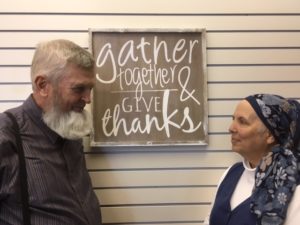Do Bluebirds Still Sing?
By Jim Huskins
McDowell County
Canadian songwriter, Hod Pharis, had low expectations when he recorded I Heard the Bluebirds Sing in 1952. Five years later, the popular Nashville trio, The Browns, took Bluebirds to the top of the Country charts. The still-popular song has been covered by many artists.
It tells of a young, mountain couple who fall in love: “I courted her for months on end until she promised we would wed. We planned on being married in the spring. All through the long cold winter months, it seemed that spring would never come. And every gloomy winter’s day I heard the bluebirds sing.”
The story’s tension is resolved in verse three: “And when at last spring touched the earth, we were married in the village church. Our wedding seemed just like a dream come true. So many years have come and gone, our love is still as true and strong, as when I found her long ago, and still, the bluebirds sing.”
Traditional weddings—often in June—remind us that the home is the foundation of social order, but is that still true? Marriage has fallen from favor with couples from every demographic. Shockingly, many who identify as “Evangelical Christians” now consider marriage “optional.” The Bible makes no such claim.
God’s plan is not cohabitation. He specifies a lifetime, covenant commitment between one man and one woman. “It is not good that the man should be alone; I will make him a helper fit for him.” (Genesis 2:16). “Therefore a man shall leave his father and his mother and hold fast to his wife, and they shall become one flesh.”(Genesis 2:24). If God never changes, how can we who claim to love Him now hold marriage in low regard?
The Bible is the story of a loving God going to unimaginable lengths to redeem the object of His affection—the Nation of Israel. Marriage imagery is woven throughout the fabric of the relationship He offers. At Sinai, God promised to be our Husband if we will be faithful to His instructions. Torah was codified in the form of marriage vows. See Exodus 19:5 and Ezekiel 16:8. These vows are serious. The penalty for violating them is bloodguilt that can only be paid by the death of the offending party. The Prophets and the Writings warn Israel to keep her vows to the Most High or face unimaginable pain.
God eventually tired of Israel’s adulterous idolatry. He issued a decree of divorce to the Northern Kingdom, and those ten tribes were dispersed among the Gentiles. Only God’s promises to King David kept the Southern tribes of Judah and Benjamin from a similar fate.
At Sinai, we agreed to a contract that would make God our husband. We broke that contract before the ink was dry. Only the blood of Jesus could redeem God’s bride from sin. This redemption is celebrated each year in the Feasts of God. One key to understanding those Feasts is knowing about traditional Hebrew weddings.
A young man’s father usually chooses the bride. The suitor then negotiates with the bride’s father. They agree on terms for the prospective marriage and record those terms as a contract or Ketubah. If the bride agrees to those terms, the couple is then betrothed. The groom pays the negotiated bride price and returns to his home.
The couple is now married in every way except sexual union. They live apart for at least one year. During this time, the groom must prepare a place for his bride. The bride devotes herself to keeping pure, preparing her wedding garments, and maintaining the oil lamps which will be used in the ceremony. The length of the betrothal is determined by how long it takes the groom to prepare the marriage home. The groom’s father decides when this task is finished. When he sees that the preparations are complete, he instructs his son to fetch his bride.
A member of the groom’s party precedes the group. He announces to the bride and her attendants, “Behold, the bridegroom comes.” He underscores this announcement by blowing the shofar. This is the bride’s signal to leave her home and join her intended at the place where the ceremony will be conducted.
We who are adopted into God’s family by grace through faith are chosen to be the holy bride of the Messiah. Each Spring’s Passover reminds us that He traveled to our home and paid our bride price with His precious blood. He promised to prepare our place and return to take us unto Himself. In the meanwhile, we have much to do.
Our time on earth is not about individual desires and ambitions. It is about keeping ourselves pure and accomplishing His work. How can we teach others to observe all things He commanded when we spend so much time and energy quibbling over which of His commands we can ignore? “Not everyone who says to me, ‘Lord, Lord,’ will enter the kingdom of heaven, but the one who does the will of my Father who is in heaven.” (Matthew 7:21)
Spring will at last touch this earth. The Son of God will return for His bride. “In the cities of Judah and the streets of Jerusalem…there shall be heard again the voice of mirth and the voice of gladness, the voice of the bridegroom and the voice of the bride, the voices of those who sing as they bring thank offerings to the house of YHVH.” (Jeremiah 33:10-11)
Many will wail as they are shut out of His presence. Only those devoted to keeping themselves holy will be prepared for the wedding. They will know what it means to hear the bluebirds sing.
Obedient Heart Fellowship believes that the entire Bible is both true and relevant. We accept salvation by grace through faith in Jesus, and we attempt to love and serve Him by keeping his commandments. See Revelation 14:12. lostranger@mindspring.com
__________________________________________________
Jim & Beverly Huskins are members of Obedient Heart Fellowship. You can read more good Christian news from Jim HERE.
__________________________________________________







